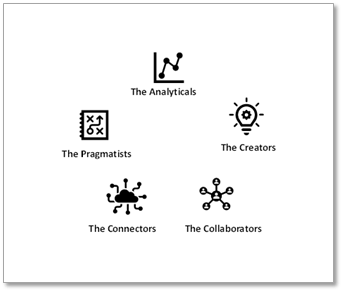By Kimberley Hacquoil, Exploristics CDSO
Drug development is hard and complex, and every day clinical development teams encounter multifaceted challenges on how best to get treatments to the patients who need them. These challenges can range from very specific study level decisions regarding data integrity, patient retention and trial monitoring, to very broad strategic discussions related to market access and reimbursement, competitor landscape and positioning, and indication sequencing and prioritisation. Whatever challenge is faced, multi-functional teams need to work together to collectively solve problems, where often there is no one-size fits all solution. Professionals with diverse expertise and backgrounds will employ various problem-solving styles based on their role, personalities and experiences.

Different problem-solving styles.
Different styles include:
- The Analyticals
Analytical problem solvers are known for their logical thinking and structured approach. They thrive on data, facts, and careful analysis. They will often be the ones who have detailed plans and strategies to tackle any issue. Often this may be the statistician or quantitative expert on the team.
- The Creators
Creative and intuitive problem solvers can be quick to make decisions and often rely on their gut feelings and instincts to guide them through challenges. These people often see the bigger picture and are inspired thinkers who can find innovative solutions when the traditional approaches seem unfeasible. Often (but not always), this may be the clinician or medic on a team who has extensive prior experience.
- The Collaborators
Collaborative problem solvers thrive in team settings and want to work with others to combine the collective knowledge and skills of the group. Often, they are great communicators, facilitators and diplomats which makes then valuable assets when it comes to solving complex problems involving multiple perspectives and viewpoints. Often these people are the project team leads, bringing all the different areas of expertise together in a cohesive team.
- The Connectors
Systematic and connective problem solvers have a talent for seeing associations between different elements in complex systems or situations. They can assimilate information to identify root causes and understand how changes in one area can affect the broader picture. Often focusing on addressing problems at the source, this means the solutions they provide are often longer-term and sustainable. This may be the biologists or regulatory experts who can bring together insights from lots of different moving parts to a situation.
- The Pragmatists
Pragmatic problem solvers focus on practical and real-world solutions and are inclined to not overthink or overcomplicate things. They are motivated by actions to keep things simple and straightforward, with an aim to get the job done efficiently and effectively. They may be the clinical operations people, who have expertise in delivery so approach problem solving in this way.
Understanding your own natural style and the style of those around you
It’s unlikely that you will fit nicely into just one of these categories and you may find that in certain situations you have exhibited all of these different styles. However, you may have a dominant or natural style that you lean towards, especially in pressured situations. Solving problems, especially in a team setting, is a dynamic process, and so flexibility in styles and approaches is key to success. It’s also vital to have a balance of styles within a team so that effective decisions can be made.
So next time you are solving problems in your clinical or drug development team, it may be beneficial to take a step back, be mindful of what style you naturally want to take, what style those around you are taking and what approach will be best to use in the current setting. By embracing diverse approaches, these teams can navigate the intricate challenges of drug development and contribute to the advancement of healthcare and medical science.
Read more:
Pioneering in healthcare can be hard, six ways to make it easier
Designing clinical studies for success
Dicing with Design: Four insights from the sinking of the Vasa
Designing clinical studies for success and not failure
Shifting the development paradigm with innovative trial design
Revolutionising clinical trial design with in silico studies
Statistical Consulting Services
Watch more:




